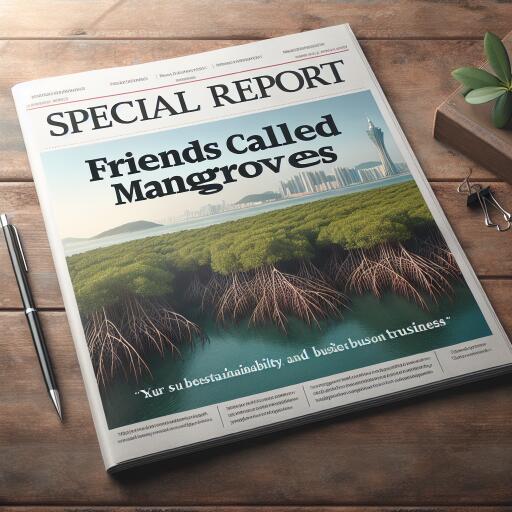
Special Report – Friends called mangroves | Macau Business
Recent initiatives have focused on expanding the wetlands in Macau, with a particular emphasis on mangrove planting. Over a span from 2009 to 2023, more than 40,000 mangrove seedlings were introduced to the coastal edges of the Taipa Marginal Leisure Area. Last year witnessed the addition of about 800 more of these resilient trees during the annual Macau Green Week in March.
Today, Macau boasts around 30 hectares dedicated to mangrove wetlands. The significance of this effort has not gone unnoticed. In 2013, the Macau Mangrove Wetland gained accolade as one of the top ten most alluring wetlands in China. Furthermore, in 2015, the State Oceanic Administration praised Macau’s coastline restoration methods, particularly the planting of mangroves, as exemplary practices.
Why Mangroves Matter
Mangroves are unique in their capacity to filter pollutants, including heavy metals, thus enhancing the quality of coastal waters. Additionally, these ecosystems play a crucial role in combating climate change. By serving as natural barriers, they absorb the brunt of strong waves, thus safeguarding the coastline from erosion.
Researchers at the University of Saint Joseph (USJ) are at the forefront of mangrove research. Their studies reveal that mangroves act as natural wastewater treatment systems, trapping sediments, absorbing excess nutrients like nitrogen and phosphorus, and neutralizing various pollutants such as pesticides. These characteristics make mangroves invaluable for water filtration in coastal environments and contribute to reducing water contamination.
Their ecological importance is manifold. Mangroves are biodiverse ecosystems supporting numerous organisms that play a part in decomposing and recycling organic material. Among these are microbial species with high biotechnological potential, poised to assist in environmental clean-up, abate climate change through carbon capture, and pioneer sustainable materials like bioplastics and biofuels.
Despite these vast benefits, the full potential of mangroves remains largely untapped, both within Macau and beyond.
Scientific Developments in Wetland Research
Recent studies have expanded the understanding of wetland ecosystems. Efforts by researchers from the Macau University of Science and Technology have provided insights into wetlands through “remote sensing classification.” These ecosystems play vital roles in biodiversity conservation, water purification, and coastal protection.
The benefits of mangroves are not confined to Macau alone. Research indicates that mangrove forests serve as effective coastal defenses, especially in regions like the Pearl River Delta. They can potentially mitigate extreme water levels during storms, although the intricate dynamics in complex estuary systems still require further clarifications for better implementation. Reflecting on past events, such as the super-typhoon Hato in 2017, researchers noted the effectiveness of mangroves under such extreme conditions.
Progress in Ocean Science and Technology
The University of Macau (UM) has been proactive in advancing oceanic studies, marked by the establishment of the Department of Ocean Science and Technology in 2022. This department focuses on deepening regional ocean research, nurturing talent, and addressing issues related to ocean environments and disaster mitigation.
Further building on this foundation, UM formed the Centre for Regional Oceans in 2020, with aspirations to spearhead innovations in offshore engineering and ocean ecology. This center aims to create a platform that aligns with regional needs, especially for the Guangdong-Hong Kong-Macao Greater Bay Area (GBA).
As these initiatives progress, it’s clear that mangroves will continue to play a pivotal role in MACAU’s environmental strategy. These efforts underscore the need to explore and harness the full range of benefits that mangroves offer, blending ecological preservation with technological innovation.





Leave a Reply